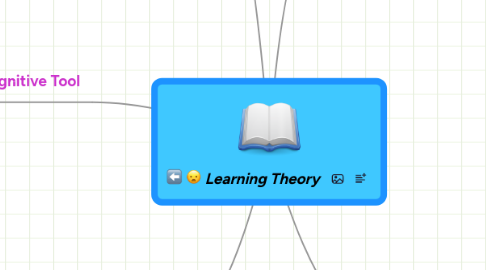
1. Behavorism
1.1. stimuli,response,feedback,reinforcement
1.1.1. classical conditioning
1.1.1.1. stimulus evoke response
1.1.2. operant conditioning
1.1.2.1. consequence affects behaviour
1.2. implications
1.2.1. Learning through practice and feedback
1.2.2. Examples
1.2.2.1. intensive behavioral intervention, token economies, discrete trail training
2. Technology and Learning
2.1. constructivist model
2.1.1. Learning with technology
2.1.2. Learner active
2.1.3. examples
2.1.3.1. mindtools, Mindmeister
2.2. instructivist model
2.2.1. Learning from technology
2.2.2. Learner passive
2.2.3. sequenced and programmed learning
2.2.4. example
2.2.4.1. drill and practice
3. Cognitive Tool
3.1. intellectual learning partners
3.2. mind tools
3.3. knowledge construction tool
3.4. computer-based tools
3.5. example
3.5.1. Mindmeister
4. cognitivism
4.1. mind processing information
4.1.1. rules, algorithms,pattern
4.2. internal mental processing
4.3. implications
4.3.1. Transfer of knowledge through cognitive strategies
4.3.2. examples
4.3.2.1. scaffolding learning, CAT(computer assisted teaching), distance learning
4.3.2.2. Mind map, PPT Presentation,eLearning,Memory technique
5. constructivism
5.1. Learner's attention, experience, metacognitive strategies
5.2. construct knowledge
5.2.1. thinking
5.2.2. interpret experience
5.3. active assimilation and accommodation
5.3.1. work to solve
5.3.2. collaboration
5.4. self-directed exploration and discovery
5.5. implications
5.5.1. interactive learning
5.5.2. examples
5.5.2.1. reciprocal learning,critical exploration, problem-based learning, inquiry-based learning
5.5.2.2. MOODLE, eClass, WebCT, MyITSchool, RISAL, Google DOC, OneNote
